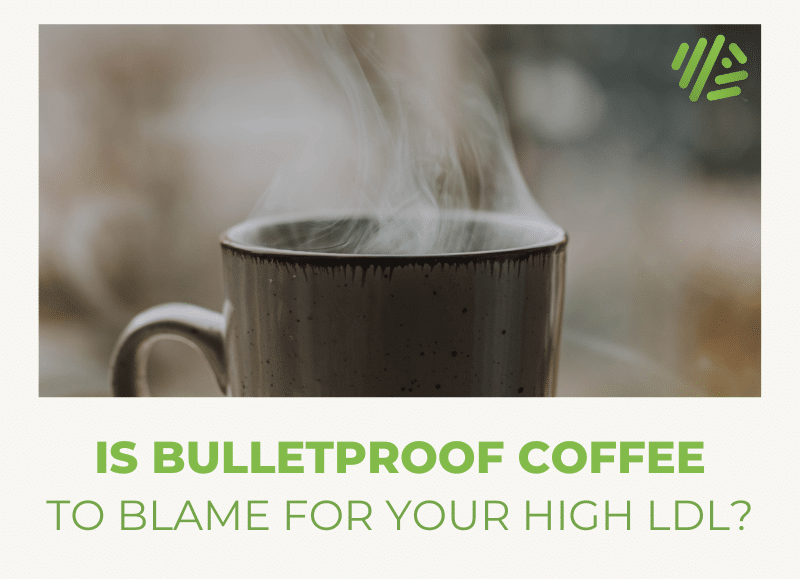Is Bulletproof Coffee to Blame for Your High LDL?
Genes Mentioned

Contents
Why do some people see an increase in LDL on the Bulletproof diet?
Let’s dig in to find out more.
For the better part of half a century a high dietary intake of cholesterol was identified as the major cause of heart disease, and a low saturated fat/cholesterol diet was promoted in the west as a result.
Numerous studies have since identified weaknesses with this hypothesis, and as a result, in 2015 the USDA Dietary Guidelines Advisory Committee reversed the long-standing recommendation that people limit dietary cholesterol intake. 1
However, dietary cholesterol, as is found in eggs, is not necessarily the same thing as dietary saturated fat, as is found in butter and ghee.
Whilst the jury is still out on the relative risks and benefits of saturated or unsaturated fats, and an emerging body of research teaches us that a personalized approach is best, numerous diet plans have appeared promoting the benefits of a high fat, low carb diet.
Background on low carb diets and ketosis
By virtually eliminating carbohydrate intake, the body enters a state of nutritional ketosis; whereby ketone bodies (derived from the breakdown of fat) rather than glucose (derived from carbohydrates) provide the majority of the bodies energy.
While it’s not for everybody, this state has been associated with some positive outcomes such as weight loss, improvements in type 2 diabetes and numerous cognitive benefits (although there is no robust data backing up this particular claim).
However, it has also been associated with negative impacts such as impaired kidney function and the development of osteoporosis. 2 3
A common association with these diets is replacement of long chain triglycerides with medium chain triglycerides (MCTs). Coconut, palm kernel oil and numerous dairy sources are key dietary sources of MCT, however many people use MCT oil supplements to maximize their intake.
What is Bulletproof Coffee?
A proprietary blend of grass fed butter, MCT oil, and high quality coffee.
Before there was Bulletproof coffee, the Tibetans and other Himalayan cultures, drank Yak butter tea. 4 Bulletproof Coffee, as developed by David Asprey, and is a spin off of this ancient Himalayan tradition.
The company is one of the major players in the “high fat (MCT), low carb” diet world, albeit in an extreme form. Bulletproof coffee is a cup of coffee made from “upgraded” mycotoxin free beans and supplemented with 1-2 tablespoons of grass-fed (rather than corn fed) unsalted butter and 1-2 tablespoons of a proprietary MCT oil. The added fats, in the form of MCT and butter, increase the blood ketone levels of those who drink it.
Proponents claim that it delivers numerous health and cognitive benefits.
Bulletproof Coffee and high LDL
An important question is what does following a “high fat, low carb” diet actually do to the levels of LDL in the blood?
In a meta-analysis of several studies, blood triglyceride levels were decreased by an average 2.2 mg/mL, potentially as triglycerides are being broken down into ketone bodies rather than stored.
Cholesterol (0.9 mg/mL), LDL (0.5 mg/mL) and HDL (0.5 mg/mL) in comparison were all increased in those following high fat, low carb diets. 5
There is no data describing the effect of Bulletproof Coffee in a large population, however this report describes a patient presenting with hyperlipidemia (elevated levels of lipids in the blood) after regularly drinking Bulletproof Coffee. Importantly, this man saw an increase in triglycerides, which were not elevated in those on more traditional ketogenic diets.
LDL, and in particular a subset known as small dense LDL (sdLDL), are associated with the development of atherosclerotic plaques on the blood vessel walls. These plaques result in the narrowing of the blood vessels, and if ruptured can result in the rapid development of blood clots leading to a heart attack.
Genetic variants that might not do well on Bulletproof Coffee
There are numerous polymorphisms which associate with increased levels of LDL.
| SNP ID | Gene(s) of interest within or near associated interval | Major allele, Minor allele (Risk) |
|---|---|---|
| rs6544713 | C, T | |
| rs515135 | C, T | |
| rs12740374 | G, T | |
| rs3846663 | C, T | |
| rs2650000 | C, A | |
| rs1501908 | C, G | |
| rs6511720 | G, T | |
| rs6102059 | C, T | |
| rs10401969 | T, C | |
| rs11206510 | T, C |
Table adapted from: https://www.genome.gov/pages/research/dir/commonvariants30loci.pdf
Taken from my previous post, this table shows several polymorphisms that have an association with increased levels of LDL. Importantly, none were directly correlated with an increased risk of heart disease.
However, it is important to note that these studies were performed on normal populations, not ones supplementing their diet with very high levels of saturated fat. It remains unknown whether the risk alleles result in the production of more LDL regardless of lipid level, or if this would be altered when undertaking a high fat diet. Additionally, it is unknown if there are any functional differences in LDL associated with these polymorphisms which when in association with high blood triglyceride levels may prove harmful to heart health.
Short-term symptoms of Bulletproof coffee
But in this instance we’re talking about longterm heart health, how can we fit the acute reports of a racing heartbeat or heart palpitations that some people report after taking MCT oil or drinking Bulletproof Coffee?
The short answer is, we don’t really know. But there are a couple of hypotheses we can make:
- By replacing a “nutrient rich” balanced meal, with a high fat, but otherwise “nutrient poor” drink it is highly likely that the body is being deprived of key nutrients/minerals/vitamins etc.
- As we’ve discussed previously vitamin D is key in regulating calcium uptake. As vitamin D is fat soluble, one possibility is that with increased levels of fat circulating in the bloodstream, there is a concurrent increase in vitamin D in the blood as well. This may in turn trigger a greater increase in calcium absorption, leading to a racing heart or heart palpitations.
Both these hypotheses are just that, and so should be taken with a pinch of salt. Until we can really understand the mechanism which is triggering this effect in some people, we can’t really investigate the possible mechanisms.
Take-Home Message
It’s impossible to say whether Bulletproof Coffee is beneficial or harmful to health without proper large scale scientific studies. Whilst saturated fat and cholesterol may not be the bogeymen we thought they were, and should form part of a healthy balanced diet, the extreme dose associated with Bulletproof Coffee may be of concern.
Those who carry one or more of the risk alleles described above should consider careful monitoring of their blood lipid level before drinking Bulletproof Coffee, or consider less extreme ketogenic diets.
Please share your experiences in the comments section.




I’ve been drinking bullet coffee for about 2 years. I usually add 1 T + of MCT oil. I eat a moderate high fat diet and eat very few carbs, very little sugar. I just had some tests ran and my LDL is 135 and I also found out I have a 4/3 apoe gene. My doctor is telling me now to do the apoe
Diet : 20% fat, 25% protein and 55% carbs. I’m so confused about the amount of carbs, especially the amount of grains and starches the apoe diet suggests? What are your thoughts on this? Thank you!
So – the question I don’t see an answer to is “if I test high for total cholesterol after starting Bulletproof, will I see a drop in my numbers when I stop? and if so, approx how long should I wait to get retested?”
Thanks!
Hey Jeff, probably a question for your doctor, but if I was to weigh in, I’d say getting a blood draw on the heels of 3-4 week experiments makes sense. So eat Bulletproof for about a month, test, then go plant based for a month, retest.
Just got my lipid panel and I, too, saw a serious increase (almost 100 mg/dL increase) since I started drinking Bulletproof coffee (and I skip the MCT oil). I am now at 247 total cholesterol, although my HDL is on the high-end of good (77) and my triglycerides are fine (88). This would just be from all of the grass-fed butter!
I’ve just received my lipid profile results after finishing a bottle of bulletproof brain octane, using as instructed. My triglycerides went from 135 to 325. My hdl dropped to 44 from 63 and my total cholesterol increased to over 200 from 176.
And, I never saw any positive results – no weight loss and no increase in brain function.
Thanks for the comment Jill. No doubt that these MCT products do terrible things to some people’s lipids.
Hello, would you suggest taking bergamot at the same time as rosuvastatin or at a different time to that medication?
Hi Pat, thanks for the comment and for reading. That one is probably a question best left for your doctor.
Hi, I had my total cholesterol checked 03 October and it was 6.3 mol/l. Yes, high but not that bad considering that I have been on a hf/lc type eating for over 3 years. I decided to try bullet proof coffee and after 2 months had my cholesterol checked again. My readings were in the mixed hyperlipodaemic range. My total cholesterol has shot up to 8.5 mol/l with and my triglycerides were also very high. I for one was shocked and am now reconsidering which saturated fats are not working for me.
Hi Miles, thanks for sharing. That would fit as Bulletproof Coffee is a particularly extreme version of the high fat diet.
Did you find any benefit from trying it? As I know most people who do, are coming from a “normal” diet, not switching up from a HF/LC diet as you describe.
Interesting posts on MCTS and Bulletproof. I cannot comment directly for commercial reasons, but please check out Dr. SOS Nutrition Consulting on Facebook, and KetoMCT.com and numerous technical responses to customers questions on Amazon.com (under KetoMCT.com). Thought these posts may be of interest to this site. I originally developed C8 KetoMCTs to treat my son’s type 1 diabetes, because I did not trust any commercial MCT products being sold-had to develop my own…
DR. Alvin, could you share your take on how the Bulletproof diet impacts lipid markers in some of your patients? Sounds like you might have a different point of view, which is welcome.
Very informative post Aaron. I think Dave Asprey has done a great job with Bulletproof. I am definitely a fan of the podcast. Having said that, I’ve also had a number of conversations with friends, doctors and people on some nutrigenomic forums, all of whom have stories about major lipid problems when on the Bulletproof diet. Could be that the issue is user error and they’re not following the diet properly. More likely, it’s another example of one size fits all nutrition missing the mark.